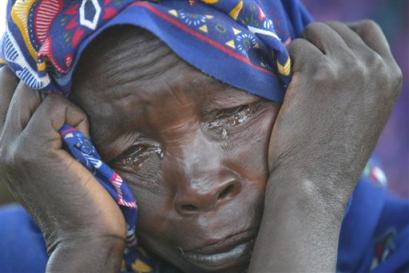Villagers who shared everything with Sudanese refugees are now in desperate need

By ALEXANDRA ZAVIS, Associated Press Writer
BAHAI, Chad, July 13, 2004 (AP) — Soundaiye Younous beat out her frustration on the pile of laundry she was trying to scrub in a muddy puddle at the bottom of a basin. The sun was not yet high in the sky when she got to the well, but already it was dry.
“Before there was lots of water,” the 15-year-old Chadian said. “But since the refugees came, there isn’t enough.”
On either side of Chad’s border with Sudan, tens of thousands of villagers have slaughtered their last sheep, shared their last water, and given up their own clothes to help the more than 1 million black Africans driven from their homes by largely Arab militias in Sudan’s rebellion-torn Darfur region.
While international attention has focused on conflicts elsewhere, U.N. officials estimate that as many as 100,000 on both sides of the border are in as desperate need of food, water, and help as the refugees.
When the first terrorized and destitute Sudanese straggled across a dried-up river bed into Chad, residents of this remote desert town opened their homes, their pastures, and their wells to them. Six months later, refugees outnumber residents by 3 to 1 and the strain shows. Food prices have rocketed, animal fodder is running out, and fights break out regularly at the wells that still function.
Fatime Ousman turned up on Mariama Souleiman’s doorstep one morning in tears. She said Arab militiamen, known as the Janjaweed, had killed her husband, leaving her to care for their four children along with six others who had belonged to her dead brother. The 11 of them were living under a thorn tree on the outskirts of Bahai, a border town.
“My sister (in-law) was bombed by an Antonov airplane. My brother tried to run, but the Janjaweed caught him and cut him to pieces before our eyes,” Ousman recounted. “When my husband heard they were killed, he went back to try and save the cattle. The Janjaweed caught him and shot him.”
The children are now so afraid the bombers will return, they cry at the sight of a bird, she said.
Souleiman, who sells candy and sodas at the local market, gave the family two rooms to live in and food, clothes, and blankets.
“We don’t have much ourselves, but we couldn’t watch people suffer like that,” she said. “If you had seen them when they first came, you too would take the clothes off your back to help them.”
For 17 months, Arab raiders on horses and camels, backed by Sudanese airplanes and helicopter gunships, have razed hundreds of villages in Darfur in attacks described by human rights groups as ethnic cleansing. Up to 30,000 people have been killed, the United Nations estimates.
The Janjaweed have also followed the more than 200,000 people who have crossed into Chad, attacking and looting both the refugees and their hosts and reportedly killings hundreds and stealing thousands of cattle, say Chadian officials.
U.N. and U.S. officials accuse President Omar el-Bashir’s government of backing the militias. Sudanese authorities deny any complicity in the attacks and have pledged to disarm the Janjaweed.
Armed Chadian soldiers in turbans and dark sunglasses now cruise the 600-kilometer (373-mile) border in pickup trucks to ward off further attacks. On Saturday, el-Bashir and his Chad counterpart President Idriss Deby agreed to set up joint border patrols and to investigate the damage caused by cross-border attacks.
Jan Egeland, U.N. under-secretary-general for humanitarian affairs, concedes the international community took too long to respond to the slaughter in Sudan and its consequences in Chad, in part because of the focus on the Iraq war. He also blames the remoteness of Darfur, insufficient funding, and restrictions imposed by the Sudanese government on humanitarian work in the region.
In the meantime, the burden of supporting the displaced has fallen on local communitiesm stretching meager resources to the limit.
Refugees began arriving in Bahai in numbers in January, but it took another two months for the first international food aid to come. So residents pooled what they had to provide food, blankets, and clothing to the refugees.
Many of the locals come from the same ethnic groups as the refugees, and there are strong ties, said Heken Bechir, an administrator in Bahai. But the cost has been high.
“Now (the local people) have run out of everything,” Bechir said. “But nobody is helping the local population.”
Water, always scarce, is the biggest problem. Bahai’s 5,000 residents are sharing their wells with an estimated 15,000 refugees – a situation expected to worsen as Chadian herders return from grazing their cattle further south, doubling the local population.
Humanitarian workers have been digging wells, but half turn up dry. So they have started trucking in water as the U.N. refugee agency prepares to move the Sudanese to a new camp at a safe distance from the border.
Prices at the local market have tripled, and even Souleiman’s family is feeling the pinch. They have cut back from three to two meals a day and asked Ousman to start paying her for rooms.
This month, neighbors helped Ousman raise the 15,000 CFA francs (US$30) rent. But she has no idea where the money will come from next time.
“We are in the hands of God,” she said.
